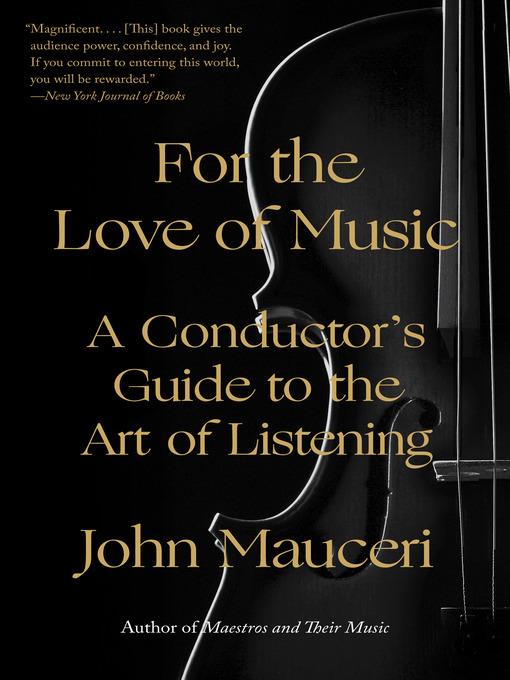
For the Love of Music
A Conductor's Guide to the Art of Listening
کتاب های مرتبط
- اطلاعات
- نقد و بررسی
- دیدگاه کاربران
نقد و بررسی

May 20, 2019
Classical music is “the epitome of Western art and human expression,” according to this passionate meditation. Grammy Award–winning conductor Mauceri (Maestros and Their Music) takes an impressionistic ramble through the classical canon, celebrating its unique ability to convey narrative drama with extraordinary emotional force despite being a wordless evanescence of “invisible houses made of vibrating air.” In loosely thematic chapters, he sketches basics of music theory, compositional structure (he gives an illuminating discussion of Richard Wagner’s use of leitmotifs, musical phrases associated with characters or events, to orient listeners during his stupefyingly long Ring operas), the electrifying charisma of live acoustic performances with their high-wire displays of physical dexterity married to complex aesthetic decision-making, and the elevating effect of classical music’s suggestion of a harmonious moral order. Writing in graceful, engaging prose, Mauceri weaves in his own experiences of listening and conducting, along with evocative appreciations of favorite pieces. (In Shostakovich’s Fifth Symphony, a musical portrait of Stalin’s Russia, “the timpani pounds out a repeated series of inflexible and barbaric eighth notes, all of which begin to accelerate, as if we were under the heels of a thousand jackboots.”) Mauceri’s love letter will provoke newbies to give classical a whirl and inspire fans to listen with fresh ears.

July 1, 2019
A warm introduction to the world of classical music. Mauceri (Maestros and Their Music: The Art and Alchemy of Conducting, 2017), who has won a Grammy, a Tony, and three Emmys, invites us into his beloved world of music. Aimed at novices, his book "attempts to sum up a lifetime of feelings" about classical music, which "contains within its two words an immensely varied cache of organized sound." The author's joy for music is infectious. He wants to share the love of classical music he first discovered in 1956 as a 10-year-old listening to the "cosmic power" of Beethoven's Eroica for the first time on a TV show. Beethoven's "nine symphonies," he writes, "constitute the greatest sequence of symphonies ever composed." Classical music began with the "towering achievements" of Bach, the "divinely inspired architect," and Handel, the "great cosmopolitan entertainer," both born in 1685. More talented Germans, including Hayden and Schubert, followed. After a concise chronological history of musical instruments, from the winds to percussion, bells and cymbals, the keyboard, shaped for the human hand, and the strings, Mauceri explores the nature and structure of music as metaphor and the process of listening: "The audience is always the ultimate translator of music." Within the subjective territory of music and morality, he argues that classical music can "make us better." It's a "force of good" and "projects optimism." Kenneth Clark had his art and architecture, but Mauceri writes that classical music "stands as the pillar of who we are as a civilization." The last chapter confronts diversity in classical music, and historically, the author admits, it has come up wanting. However, "gender and racial balance within orchestras has significantly improved," and Mauceri notes the number of black and non-European conductors who "broke racial barriers" in recent years. Even those who know classical music well will learn something from this lively and enthusiastic primer.
COPYRIGHT(2019) Kirkus Reviews, ALL RIGHTS RESERVED.

August 1, 2019
Classical music is everywhere: radio and television commercials, movie and cartoon soundtracks, cell phone ringtones. But it's so much more than background music. As Leonard Bernstein did with his Young People's Concerts (still available on YouTube), his colleague and protégé Mauceri unlocks the key to its enjoyment in this eloquent and inspiring book. A noted conductor in Hollywood, on Broadway, and on the stages of opera companies and symphony orchestras around the world, Mauceri (Maestros and Their Music: The Art and Alchemy of Conducting) skillfully incorporates his musical experiences, from his youth to the present. Nine concise chapters provide a capsule history of Western music, setting it in cultural and historical context, explaining its structure, and advising readers on active listening. As Mauceri writes, "Classical music is not a temporary phenomenon. It is not of the moment. It is of every moment. It waits for you and welcomes you whenever you enter its domain." VERDICT The perfect companion for those who are already well versed in classical music and for those ready to take the plunge.--Carolyn M. Mulac, Chicago
Copyright 2019 Library Journal, LLC Used with permission.

August 1, 2019
Mauceri aims to convert readers who think classical music is a snorefest. Although he grew up going to concerts and listening to classical music, Mauceri's no music snob. As a young man, he watched Leonard Bernstein in action; later in his adulthood, he knew Bernstein as a mentor and friend. In lively prose, Mauceri reveals classical music's roots in ancient Greece, and revels in the fact that it continues to find new audiences in non-Western symphony halls. He discusses the great composers and some of their works, so readers will find Beethoven and Bach, but also the more recent Korngold as well as very young composers like Anna Thorvaldsdottir, too. Mauceri demystifies various musical experiences?chamber music, ballet, and opera?and celebrates the fact that more women and people of color are playing and conducting. Classical-music aficionados will enjoy Mauceri's discussions of composers and their works. Newbies will find them instructive, but the author would caution all readers to not just take his word for it, but to experience the music and hear for themselves.(Reprinted with permission of Booklist, copyright 2019, American Library Association.)

























دیدگاه کاربران